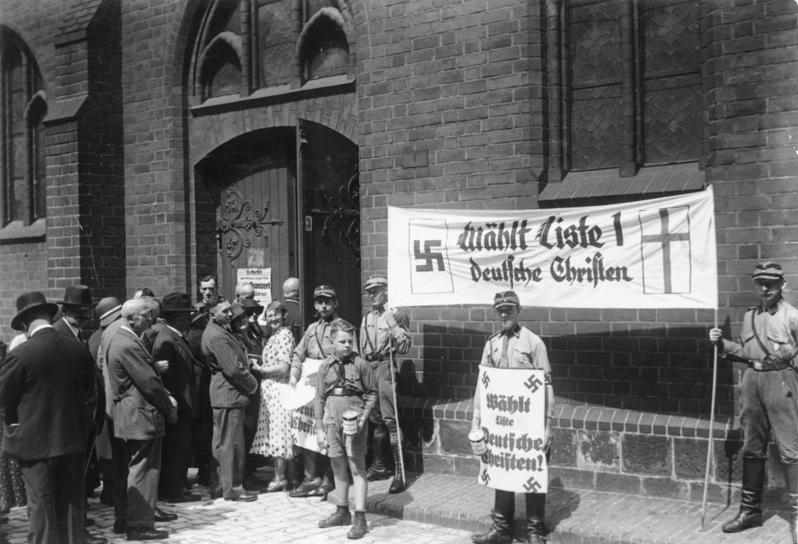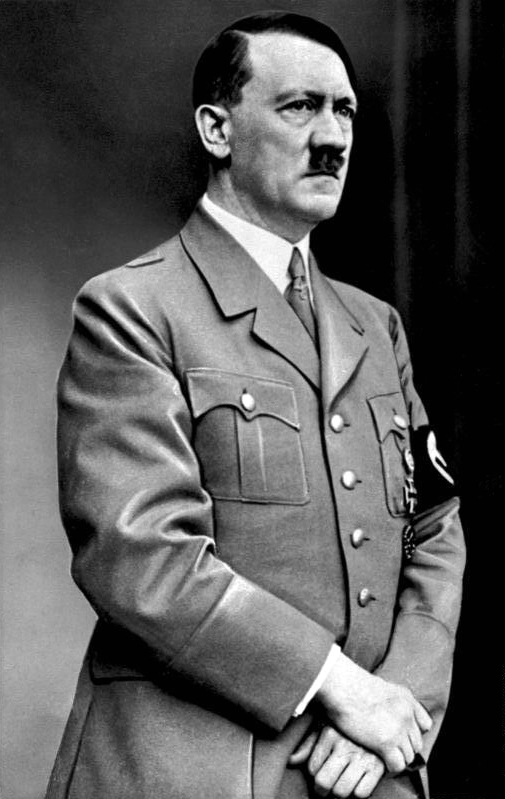|
Reichskirche
The German Evangelical Church (german: Deutsche Evangelische Kirche) was a successor to the German Evangelical Church Confederation from 1933 until 1945. The German Christians, an antisemitic and racist pressure group and ''Kirchenpartei'', gained enough power on boards of the member churches to be able to install Ludwig Müller to the office of ' in the 1933 church elections. The German Evangelical Church Confederation was subsequently renamed the German Evangelical Church. In 1934, the German Evangelical Church suffered controversies and internal struggles which left member churches either detached or reorganised into German Christians-led dioceses of what was to become a single, unified Reich Church compatible with Nazi ideology for all of Nazi Germany. In 1935, in wake of controversies and church struggles, the Ministry for Church Affairs removed Ludwig Müller and installed a committee headed by Wilhelm Zoellner to lead the confederation. As a result, the German Evangelica ... [...More Info...] [...Related Items...] OR: [Wikipedia] [Google] [Baidu] |
Kirchenkampf
''Kirchenkampf'' (, lit. 'church struggle') is a German term which pertains to the situation of the Christian churches in Germany during the Nazi period (1933–1945). Sometimes used ambiguously, the term may refer to one or more of the following different "church struggles": # The internal dispute within German Protestantism between the German Christians (''Deutsche Christen'') and the Confessing Church (''Bekennende Kirche'') over control of the Protestant churches; # The tensions between the Nazi regime and the Protestant church bodies; and # The tensions between the Nazi regime and the Roman Catholic Church. When Hitler obtained power in 1933, 95% of Germans were Christian, with 63% being Protestant and 32% being Catholic. Many historians maintain that Hitler's goal in the ''Kirchenkampf'' entailed not only ideological struggle, but ultimately the eradication of the churches. [...More Info...] [...Related Items...] OR: [Wikipedia] [Google] [Baidu] |
German Christians (movement)
German Christians (german: Deutsche Christen) were a pressure group and a movement within the German Evangelical Church that existed between 1932 and 1945, aligned towards the antisemitic, racist and '' Führerprinzip'' ideological principles of Nazism with the goal to align German Protestantism as a whole towards those principles. Their advocacy of these principles led to a schism within 23 of the initially 28 regional church bodies (''Landeskirchen'') in Germany and the attendant foundation of the opposing Confessing Church in 1934. History Antecedents Lutheranism Imperial Germany During the period of the German Empire, before the Weimar Republic, the Protestant churches (''Landeskirchen'') in Germany were divided along state and provincial borders. Each state or provincial church was supported by and affiliated with the regnal house—if it was Protestant—in its particular region; the crown provided financial and institutional support to its church. Churc ... [...More Info...] [...Related Items...] OR: [Wikipedia] [Google] [Baidu] |
Ludwig Müller
Johan Heinrich Ludwig Müller (23 June 1883 – 31 July 1945) was a German theologian, a Lutheran pastor, and leading member of the pro-Nazi "German Christians" (german: Deutsche Christen) faith movement. In 1933 he was appointed by the Nazi government as ''Reichsbischof'' ("Bishop for the Reich") of the German Evangelical Church (german: Deutsche Evangelische Kirche). Life Müller was born in Gütersloh, in the Prussian province of Westphalia, where he attended the Pietist Evangelical Gymnasium. He went on to study Protestant theology at the universities of Halle and Bonn. Having finished his studies, he worked as a school inspector in his hometown, from 1905 also as a vicar and assistant preacher in Herford and Wanne. In 1908 he became parish priest in Rödinghausen. At the outbreak of World War I, he served as a Navy chaplain in Wilhelmshaven. After the war, Müller joined ''Der Stahlhelm'' paramilitary organization and continued his career as a military chaplain, from 192 ... [...More Info...] [...Related Items...] OR: [Wikipedia] [Google] [Baidu] |
Positive Christianity
Positive Christianity (german: Positives Christentum) was a movement within Nazi Germany which promoted the belief that the racial purity of the German people should be maintained by mixing racialistic Nazi ideology with either fundamental or significant elements of Nicene Christianity. Adolf Hitler used the term in point 24 of the 1920 Nazi Party Platform, stating: "the Party as such represents the viewpoint of Positive Christianity without binding itself to any particular denomination". The Nazi movement had been hostile to Germany's established churches. The new Nazi idea of Positive Christianity allayed the fears of Germany's Christian majority by implying that the Nazi movement was not anti-Christian. That said, in 1937, Hans Kerrl, the Reich Minister for Church Affairs, explained that "Positive Christianity" was not "dependent upon the Apostle's Creed", nor was it dependent on "faith in Christ as the son of God", upon which Christianity relied, rather, it was represent ... [...More Info...] [...Related Items...] OR: [Wikipedia] [Google] [Baidu] |
Reich Ministry For Church Affairs
The Reich Ministry for Church Affairs (''Reichsministerium für die Kirchliche Angelegenheiten'') also sometimes referred to as the Reich Ministry for Ecclesiastical Affairs, existed in Nazi Germany from 1935 until 1945 under the leadership of Hanns Kerrl and Hermann Muhs and attempted to unify the churches and align them with the goals of National Socialism. Background As part of the Nazi approach to controlling all aspects of German society (''Gleichschaltung'') the regime's initial plan was to "coordinate" all 28 separate Protestant regional churches (''Landeskirchen'') into a single and unitary Reich Church (Reichskirche) under the leadership of a Reich Bishop. On 27 September 1933, the Nazis installed Ludwig Müller in this position. However, many of the German Protestant clergy supported the dissenting Confessing Church movement, formed in May 1934 under the leadership of theologian Martin Niemöller, which resisted state interference into Church affairs and affirmed that ... [...More Info...] [...Related Items...] OR: [Wikipedia] [Google] [Baidu] |
Evangelical Church In Germany
The Evangelical Church in Germany (german: Evangelische Kirche in Deutschland, abbreviated EKD) is a federation of twenty Lutheran, Reformed (Calvinist) and United (e.g. Prussian Union) Protestant regional churches and denominations in Germany, which collectively encompasses the vast majority of Protestants in that country. In 2020, the EKD had a membership of 20,236,000 members, or 24.3% of the German population. It constitutes one of the largest national Protestant bodies in the world. Church offices managing the federation are located in Hannover-Herrenhausen, Lower Saxony. Many of its members consider themselves Lutherans. Historically, the first formal attempt to unify German Protestantism occurred during the Weimar Republic era in the form of the German Evangelical Church Confederation, which existed from 1922 until 1933. Earlier, there had been successful royal efforts at unity in various German states, beginning with Prussia and several minor German states (e.g. Duchy o ... [...More Info...] [...Related Items...] OR: [Wikipedia] [Google] [Baidu] |
Bundesarchiv Bild 183-1985-0109-502, Kirchenwahl
, type = Archive , seal = , seal_size = , seal_caption = , seal_alt = , logo = Bundesarchiv-Logo.svg , logo_size = , logo_caption = , logo_alt = , image = Bundesarchiv Koblenz.jpg , image_caption = The Federal Archives in Koblenz , image_alt = , formed = , preceding1 = , preceding2 = , dissolved = , superseding1 = , superseding2 = , agency_type = , jurisdiction = , status = Active , headquarters = PotsdamerStraße156075Koblenz , coordinates = , motto = , employees = , budget = million () , chief1_name = Michael Hollmann , chief1_position = President of the Federal Archives , chief2_name = Dr. Andrea Hänger , chief2_position ... [...More Info...] [...Related Items...] OR: [Wikipedia] [Google] [Baidu] |
Nazification
The Nazi term () or "coordination" was the process of Nazification by which Adolf Hitler and the Nazi Party successively established a system of totalitarian control and coordination over all aspects of German society and societies occupied by Nazi Germany "from the economy and trade associations to the media, culture and education". Although the Weimar Constitution remained nominally in effect until Germany's surrender following World War II, near total Nazification had been secured by the 1935 resolutions approved during the Nuremberg Rally, when the symbols of the Nazi Party and the State were fused (see Flag of Germany) and German Jews were deprived of their citizenship (see Nuremberg Laws). Terminology The Nazis used the word for the process of successively establishing a system of totalitarian control and coordination over all aspects of German society and societies occupied by Nazi Germany. It has been variously translated as "coordination", "Nazification of state and ... [...More Info...] [...Related Items...] OR: [Wikipedia] [Google] [Baidu] |
Umbrella Organization
An umbrella organization is an association of (often related, industry-specific) institutions who work together formally to coordinate activities and/or pool resources. In business, political, and other environments, it provides resources and often identities to the smaller organizations. In this kind of arrangement, it is sometimes responsible, to some degree, for the groups under its care. Examples * AFL–CIO and other national trade union centers * DD172 * Department of Public Safety * European Armenian Federation for Justice and Democracy * European Music Council * European Federation for Welding, Joining and Cutting (EWF) * Federation of Poles in Great Britain * Federation of Student Islamic Societies * Independent Sector * National Retail Federation * National Wrestling Alliance * Open Source Geospatial Foundation * Software in the Public Interest * UEFA * Ulster Defence Association * United Way * Yamaguchi-gumi * National Federation of Coffee Growers of Col ... [...More Info...] [...Related Items...] OR: [Wikipedia] [Google] [Baidu] |
Berkley Center For Religion, Peace, And World Affairs
The Berkley Center for Religion, Peace, and World Affairs is an academic research center at Georgetown University in Washington, DC dedicated to the interdisciplinary study of religion, ethics, and politics. The center was founded in 2006 under a gift from W. R. Berkley, William R. Berkley, a member of Georgetown's Board of Directors.International Insurance SocietWilliam Berkley biographical sketch Page accessed August 12, 2015Berkley Center profile at IGG Page accessed August 12, 2015 The center's founding director is Thomas Banchoff. Senior Fellows Senior Research Fellows Faculty Fellows Research Fellows References External links * Georgetown University programs Re ...[...More Info...] [...Related Items...] OR: [Wikipedia] [Google] [Baidu] |
Protestant
Protestantism is a Christian denomination, branch of Christianity that follows the theological tenets of the Reformation, Protestant Reformation, a movement that began seeking to reform the Catholic Church from within in the 16th century against what its followers perceived to be growing Criticism of the Catholic Church, errors, abuses, and discrepancies within it. Protestantism emphasizes the Christian believer's justification by God in faith alone (') rather than by a combination of faith with good works as in Catholicism; the teaching that Salvation in Christianity, salvation comes by Grace in Christianity, divine grace or "unmerited favor" only ('); the Universal priesthood, priesthood of all faithful believers in the Church; and the ''sola scriptura'' ("scripture alone") that posits the Bible as the sole infallible source of authority for Christian faith and practice. Most Protestants, with the exception of Anglo-Papalism, reject the Catholic doctrine of papal supremacy, ... [...More Info...] [...Related Items...] OR: [Wikipedia] [Google] [Baidu] |
Nazism
Nazism ( ; german: Nazismus), the common name in English for National Socialism (german: Nationalsozialismus, ), is the far-right totalitarian political ideology and practices associated with Adolf Hitler and the Nazi Party (NSDAP) in Nazi Germany. During Hitler's rise to power in 1930s Europe, it was frequently referred to as Hitlerism (german: Hitlerfaschismus). The later related term "neo-Nazism" is applied to other far-right groups with similar ideas which formed after the Second World War. Nazism is a form of fascism, with disdain for liberal democracy and the parliamentary system. It incorporates a dictatorship, fervent antisemitism, anti-communism, scientific racism, and the use of eugenics into its creed. Its extreme nationalism originated in pan-Germanism and the ethno-nationalist '' Völkisch'' movement which had been a prominent aspect of German nationalism since the late 19th century, and it was strongly influenced by the paramilitary groups that ... [...More Info...] [...Related Items...] OR: [Wikipedia] [Google] [Baidu] |




